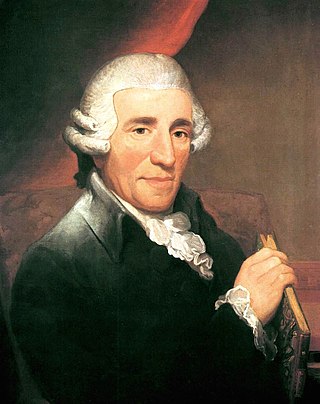
Opera buffa is a genre of opera. It was first used as an informal description of Italian comic operas variously classified by their authors as commedia in musica, commedia per musica, dramma bernesco, dramma comico, divertimento giocoso.

Der Schauspieldirektor, K. 486, is a comic singspiel by Wolfgang Amadeus Mozart, set to a German libretto by Gottlieb Stephanie, an Austrian Schauspieldirektor. Originally, it was written because of "the imperial command" of the Holy Roman Emperor Joseph II who had invited 80 guests to a private luncheon. It is regarded as "a parody on the vanity of singers", who argue over status and pay.

Opera in German is that of the German-speaking countries, which include Germany, Austria, and the historic German states that pre-date those countries.

Carl Ditters von Dittersdorf was an Austrian composer, violinist, and silvologist. He was a friend of both Haydn and Mozart. His best-known works include the German singspiel Doktor und Apotheker and a number of programmatic symphonies based on Ovid's Metamorphoses.

Comic opera, sometimes known as light opera, is a sung dramatic work of a light or comic nature, usually with a happy ending and often including spoken dialogue.

Stephen John Seymour Storace was an English composer of the Classical era, known primarily for his operas. His sister was the famous opera singer Nancy Storace.

Der krumme Teufel, Hob. 29/1a, was Joseph Haydn's first opera. This German-language comic opera in the genre of Singspiel was commissioned by its librettist, leading comic actor Joseph Felix von Kurz, from the French novel Le Diable boiteux by Alain-René Lesage. It was forbidden after two acclaimed performances in Vienna due to "offensive remarks in the text", but later revived and probably revised as Der neue krumme Teufel, Hob. 29/1b. The music is lost, though a libretto survives for each version.

Johann Gottlieb Stephanie the Younger was an Austrian playwright, director and librettist, most famously to Mozart.

The Seyler Theatre Company, also known as the Seyler Company, was a travelling theatrical company founded in 1769 by Abel Seyler. It was one of the most famous and ambitious theatrical companies of Europe in the years from 1769 to 1779, and played a crucial role in theatrical innovation, the development of a serious German opera tradition, and the Sturm und Drang movement. The Sturm und Drang period is named for a play commissioned by the Seyler company.

Carl Wilhelm August Blum was a German singer, librettist, stage actor, director, guitarist and opera and song composer. Philip J. Bone wrote that Blum was "a universal genius, uniting in one person the poet, the dramatist, composer, singer and performer." He was composer to the Court of the King of Prussia.
Franz Schubert's best-known music for the theatre is his incidental music for Rosamunde. Less successful were his many opera and Singspiel projects. On the other hand, some of his most popular Lieder, like "Gretchen am Spinnrade," were based on texts written for the theatre.
Nikolaus Hillebrand is a German operatic bass-baritone, who was engaged at the Bavarian State Opera, among others, and appeared at international festivals such as Bayreuth and Taormina. As a boy he was a member of the Regensburger Domspatzen, and returned to record sacred music with the group as a soloist.
Heiner Hopfner was a German opera, lied and concert singer as well as a singing teacher in the tenor vocal range.

Carl Friedrich Clemens Weinmüller was an operatic bass and theatre director. A bass with the Imperial Ccourt Opera in Vienna, he is known for performing Rocco in the premiere of Beethoven's Fidelio.
Carl Ignaz Anton Demmer, also Karl, was an operatic tenor at the Vienna court opera, and possibly Florestan in the first version of Beethoven's opera Fidelio on 20 November 1805, then titled Leonore, oder Der Triumph der ehelichen Liebe.
Heinrich Ludwig Schmelka was a German theatre actor, mainly in comic roles, occasionally also a singer (tenor)
The Rheinische Kantorei is a German vocal ensemble of baroque music accompanied by an instrumental ensemble called Das Kleine Konzert.










